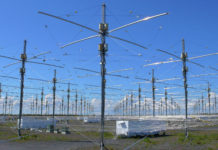Technology in education will help the students and teachers, many teachers think that implement of technology will affect their job, but it is not true technology will only easy and reduce the workload to teachers. Digital and technological classrooms make students to explore and learn new things. Technology has the power to change the teaching environment, the role of teachers and students will be changed when digitalization invaded the classrooms but instead of eliminating staff members, it needs to add additional IT staff. In this era implementing technology is very easy because every student and teacher use at least one digital device. In this world, there are many languages spoken today, so we can’t understand all the languages spoken.
CALL (Computer Assisted Language Learning) started to develop in the 1960s, educational field has the power to integrate technology along with technological development. CALL in the classroom help students to communicate with their teachers, by using applications, websites, and software to teach language to their students easily. Visual Learning is possible by using call, students will benefit from learning visually. Listening practice is important in the language learning process by using CALL software playing music or listening apps to help students to improve their listening and vocabulary skills. By adding CALL into the classroom, it creates interest and motivation in language learning and eliminates the boring parts in the learning by including animations, videos, VR, games will create increase student’s interest. For solo learners CALL will allow them to have a non-sequential habit, it will help to develop additional skills. Immediate feedback is one of the best advantages in CALL, using test and quizzes platforms will give feedback immediately after the student completed the answer it encourages them by showing the feedbacks. An error can be reduced using CALL in classrooms, computer will help students to identify errors they have done.
Digital media and multimedia are the best way to learn a language, using media like videos, audios, etc. Using digital media teachers and students can record classes and use it in the future if anyone got doubts about the lesson. Using websites, we can get up to dated sources for 24 hours. CALL will be useful for self-studying students; self-study is necessary for every student after class hours students can easily connect to the source they want to learn. Developing written skills using text and document apps students can practice writing skills by writing blogs, poems, and contents. In digital media we can track our progress like how we have written, time spends to write, read, etc, and mistakes done by us also be recorded so we can track our progress. Digital learning in class makes students smarter, tools and technology help students to develop their language skills, students can learn anything they want, and they can also choose the method to learn.
Social Media is the best way of communication, using this platform we can communicate to anyone with digital devices. Communication and collaboration is the social media’s best advantage, students can message and chat with another student or teachers all over the world even they communicate with other native language speakers. Some teachers and parents fear of misuse or mislead, so they can use tracking apps and software to view and analyze student’s usage. Improve reading skills following professionals in social media platforms like LinkedIn, where students can connect directly to every CEO and message them. Distance learning can be possible using social media through video calling and audio calling applications and software we can connect to the world audience. Teachers can use social media and create the educational group in Facebook, WhatsApp, Google classroom to share materials, instructions, educational funny clips or memes, allow students to post important and necessary links to the group, post discussion topics regularly. They can also use blogs for their assessments will help them to improve their skills, they can post book reviews, research papers, or other assessments on the digital media platforms.
AI (Artificial Intelligence) can be included in every process, in language learning, AI can help us by automating applications and software. AI can be used to monitor and analyze the student’s process; it can produce the report in a short time by analyzing students. In China they started to use AI for the entire educational system, AI can monitor students listening capacity if the student was not paying attention to the class it will notify the teacher and it monitors every move of the student and at the end of the day it was programmed to send message to their parents but this method will irritate students, although it improved poor students listening skills and reading skills. AI can save teachers time and improves efficiency because it has human thinking skills like analyzing, learning, thinking, and most importantly problem-solving. It can reduce the burden of tasks of teachers. AI can be used in translation, it can automatically translate a word if we show it in a picture or text it automatically translate a word. it can also use in voice-assisted application like Google assistant, Alexa, and Siri, by using these apps we can develop our speaking skills and listening skills then we can search by just dictating the word.
I created and shared survey forms through social media and requested teachers, students, and research scholars to answer them, technology helped my research to reach targeted audiences and made them to answer it. In that form, I asked them what digital device they are using, how students referred to learn, and teachers referred to teach. I asked them how they and where did they get their learning and teaching materials, by using books or by using a library or by using a website to buy books and eBooks or to download free or torrent eBooks or using a website to get summaries and study materials. Then I asked their recommendation to digital implementation in a learning environment, and how teachers and students used to teach and study. How they study while pandemic and how their online class went during covid19 pandemic. I asked them how they are planned to do their projects and if they recommend and engage to have online class, assessments, exams, projects through the digital method. By sending my form to digital and social platforms, I received 65 responses from students, 19 from undergraduate students, 35 from postgraduate students, 6 from school students, and 5 from students preparing for government exam and CA exam. From the survey form, I received 14 responses from teachers, 8 from language teachers, and 6 from non-language teachers. Then 5 responses from research scholars.

In the above chart (Figure 1) we can see that maximum of the responders use digital devices like mobile, laptop, tablet, kindle, etc. From 65 responses from students 62 of them use the mobile phone, 36 of them use laptops and personal computers, 11 students use tablets, 3 of them use kindle device and 1 of the students responded that he wasn’t using any digital devices. For my form 14 teachers responded, all 14 of them use mobile phones, 11 of them use laptops and personal computers, 6 teachers use tablets, and 2 of them use kindle devices. 5 research scholars responded to the form, all of them use a mobile device, 4 responders use a laptop and personal computers, 1 responder use a tablet and 2 of the scholars use a kindle device. By receiving this data, we can see that in this era maximum of students and teachers use digital and technical devices. So implementing technology into the classroom was already began may educational institutions provide digital and technical device like projectors, smart bode, tablets, laptops, etc. Some of the instructions allow students and teachers to use their own devices like personal mobile phones, laptops, and tabs for educational purposes in the classroom environment.
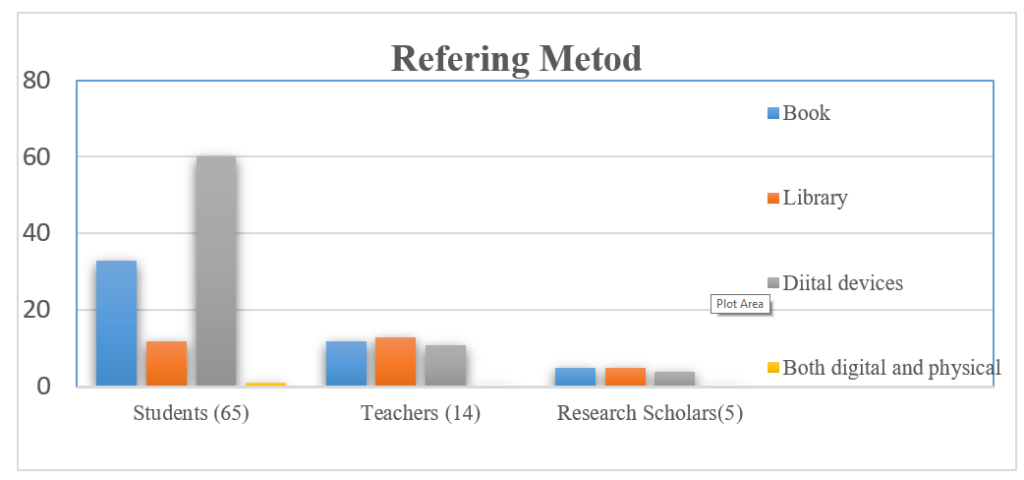
The above chart (Figure 2) shows the referring methods used by the teachers, students, and scholars. In 65 student’s responses 33 of them choose a book as a referring method, 14 of the students responded as a library, 60 responded to a digital and technical method and one responded as both. From 14 responses by teachers, 12 of them choose a book as a referring method,13 of the selected library as referring for teaching, 11 teachers selected digital and technical methods. From 5 scholars all of them selected physical methods library and book and 4 of them selected technical and digital method for referring. In this chart, we can analyze that most of the students use digital devices to refer and study. Most of the teachers are supporting both methods because today it is necessary to refer to both physical and digital methods. Physical books help teachers, students, and scholars to read, revise, analyze the written books and Digital media will help them to keep up to date. Sometimes we can’t find some books through the library here digital method helps us.


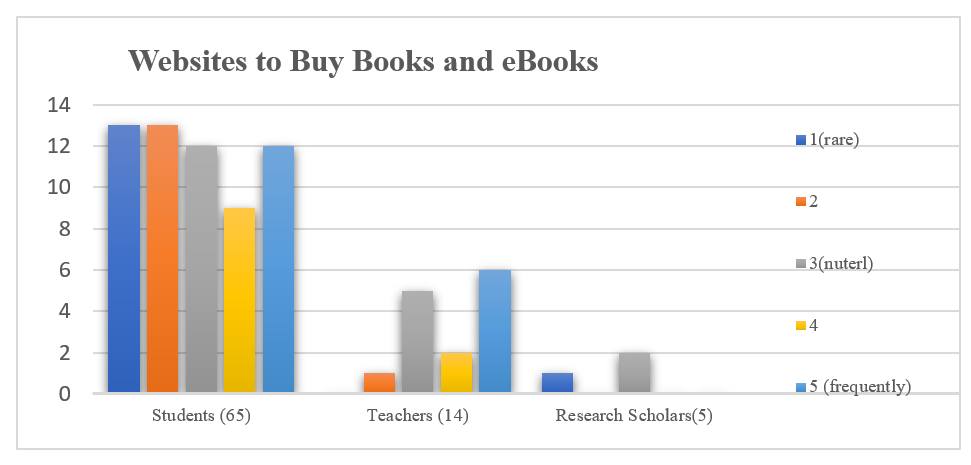
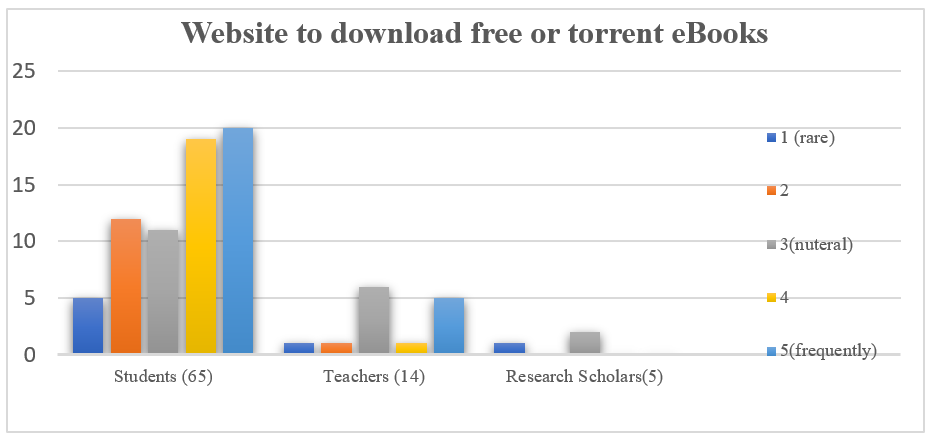
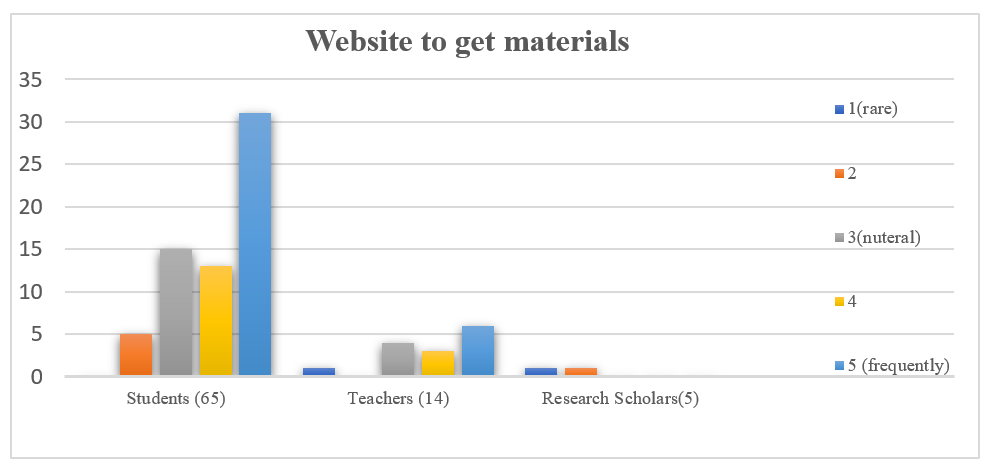
The above chart (Figure 3) shows the rare and frequent use of physical books, libraries, websites to buy books and eBooks, websites to download free books or eBooks, and getting materials using websites by a total of 65 responders. For using books 8 students responded as extremely rare,14 students as rare, 15 students as neutral,16 as common, and 14 students as frequently. From the responses, all teachers use books frequently like teachers all research scholar responders also frequently use books. Always books are the best friend to the human maximum of students, teachers and scholars use books frequently, most importantly many educational institutions encourage using books.
From figure 4 we can see the usage of the library by the responders 14 students selected extremely rare, 23 students selected rare,14 students selected neutral, 10 selected common and only 4 students selected frequently. Most of the teachers responded frequently and commonly, only 2 teachers responded naturally, like teachers all scholars also frequently use the library. From these responses, we can see that most of the students are not interest in using the library from 65 student’s responses 37 students rarely visit the library because many books can be bought or downloaded online. Teachers and scholars mostly use the library frequently they know how libraries useful; they mostly use it for references.
In Figures 5 and 6 we can see the use of the website to buy physical books and eBooks, free eBooks. Most of the responders use the website to download and buy books. 12 Students frequently use the website to buy books and eBooks, 9 students commonly use websites, 12 students are neutral in buying books using websites,26 students selected rare. Teachers always prefer to read books, 6 teachers frequently use websites to buy books, 2 of them commonly use websites, 5 of them use neutral in using the website to buy books only one teacher selected rare. One scholar selected rare, 2 neutral and 2 frequently use websites to buy books. Like amounted books, torrent and free book websites are majorly used to download eBooks. 20 students frequently use the website to buy free books, 19 students commonly use the websites, 11 students stand neutral, 12 students selected rare, and 5 of them selected extremely rare. Only 2 teachers selected rare, 6 teachers selected neutral, and 6 teachers selected frequently. 2 scholars frequently use websites to download free books, 2 neutral in it and 1 selected rare. Most of the students and teachers use websites to buy or download free and amounted book than visiting library because in some library they don’t allow us to take books, but if we have our copy of book or pdf we can use it anytime we want. But eBooks by using kindle are better to learn.
In Figure 7, we can see the responses of usage on the website to get study or teaching materials, 31 students frequently use websites to get study materials, 13 were commonly using these platforms, 15 were neutral in using it and only five of the students rarely use the websites to see study materials. Only one teacher rarely uses websites to view teaching materials, 4 teachers choose neutral, 3 of them choose commonly and 6 of them used websites frequently. 3 research scholars choose frequently and 2 of them use the website to get material rarely. In figure 7 we can see the blue was high on three of the professions, blue is frequently used. On websites, the maximum of materials will be up to dated and it is easy to get.
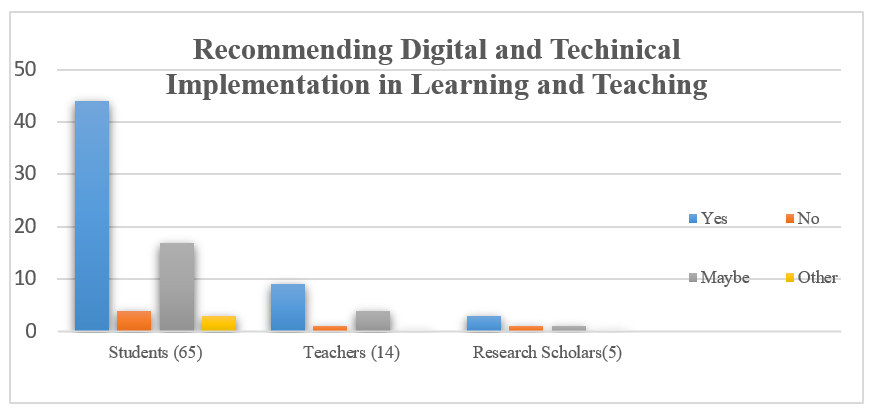
In the above chart (Figure 8) we can see the detailed yes or no or maybe answers, 44 students recommended Digital and technological implementation in learning and teaching, 4 of them selected no, and 17 of students selected maybe. They explained digital and technology was easy to use and adopt for learning, it can help students to learn more, it is easy to get and save more time, it helps students who are not able to attend physical classes, it is easier than just only referring books and we can get authentic information immediately, we could re-watch classes and clear our doubts. 9 teachers choose yes, 1 of them choose no, and 4 maybe. Teachers try harder to a better environment, so technology is the best way to improve the educational process.3 research scholars selected yes, 1 choose no, and 1 maybe. All other students, teachers, and scholars have fear of using technology in a learning environment but from proper education and management, we can break that fear.
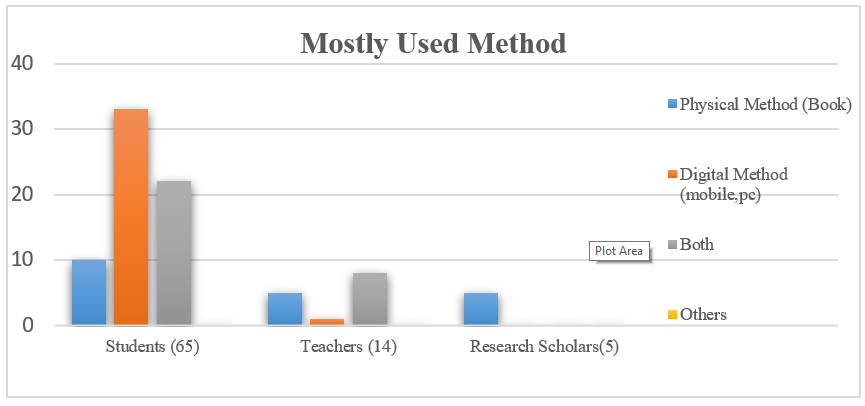
In the above chart (Figure 9), we can see the most used methods in the learning, reading, and teaching process. Of 65 students 10 students only choose to learn using books and libraries, 33 students choose digital and technical methods, 22 students choose both. By using both methods it is an easy way to learn in only physical materials or digital and technical methods. From 14 responses from teachers 6 choose physical books and materials and 1 of them choose the digital method and 8 of the teachers choose both methods. All research scholars choose physical materials like books, libraries, etc.
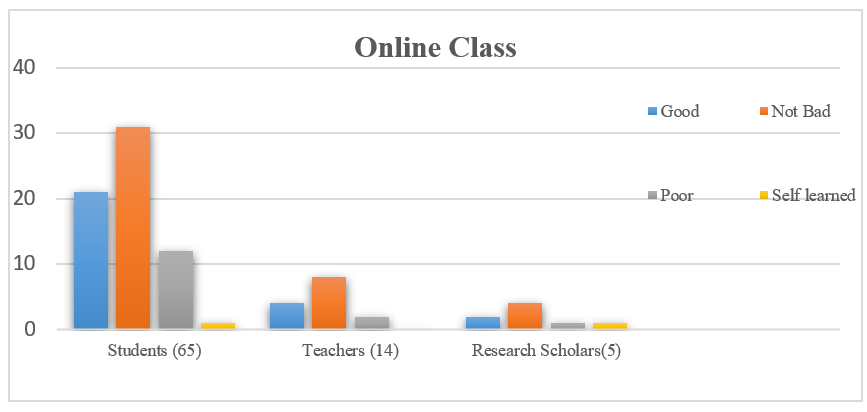
From figure 10 we can see the chart of online classes during the pandemic, in total students responded 65, 21 students choose good, 31 choose not bad,12 of them choose poor and one of them self-learned. Out of 14, 4 teachers choose good, 8 of them choose not bad and 2 choose poorly. 2 research scholars choose good,1 choose not bad, 1 of them choose poor and one chooses self-learned. Due to lack ok knowledge, technical problems, and pandemic make online class poor, most of them choose not bad due to internet problem and lack of interaction with teachers, students not willing to interact with the teacher during the online class.
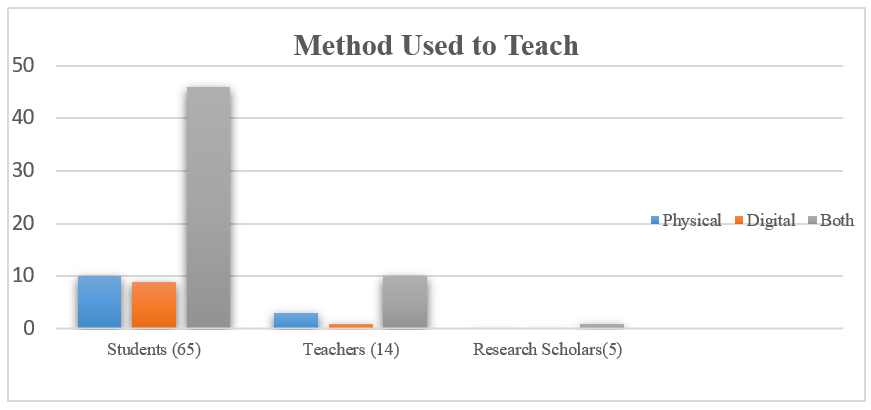
In Figure 11 we can see the responses for teaching methods used by teachers, 10 students choose the physical method, then 9 students choose the online method and 46 students choose both methods .10 teachers choose both methods,1 choose digital and 3 choose an only physical method. All five scholars choose both methods. Nowadays teachers teach through both physical materials and digital materials, it is the easiest and best way to teach students.

In Figure 12, 26 students selected yes to recommend technology in future projects, assessments, exams, tests, and quizzes, 11 of the students choose no,19 choose maybe and 9 recommend only a few concepts. 5 teachers choose yes, 2 choose no, 6 choose maybe and 1 of them recommends only a few concepts. 3 of the responses from the research scholars choose yes and 2 choose maybe.
Due to fear of digital and technical disadvantages, many students and teachers selected may be options those fear can be eliminated by proper education about technology.

According to my survey maximum of students, teachers and scholars use digital devices, in Figure 1 we can see the number of devices used by both of them. From the pie chart Figure, 12 and 13, 53% of the students support the digital way of learning. 33% of scholars support digital learning and 25% of teachers support digital learning. In Physical learning, it is vice versa only 31% of student and scholar supports the physical method. 38 % of teachers support the physical method. The above pie chart was created from the overall answers given based on responses received by digital form. Most of them are afraid of technology due to lack of technical knowledge, it can be braked by teaching technical knowledge to teachers and students. Although maximum of teachers, students, and research scholars use and support digital methods.












